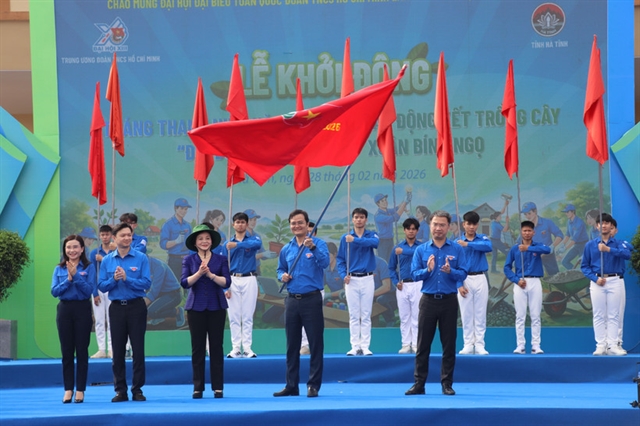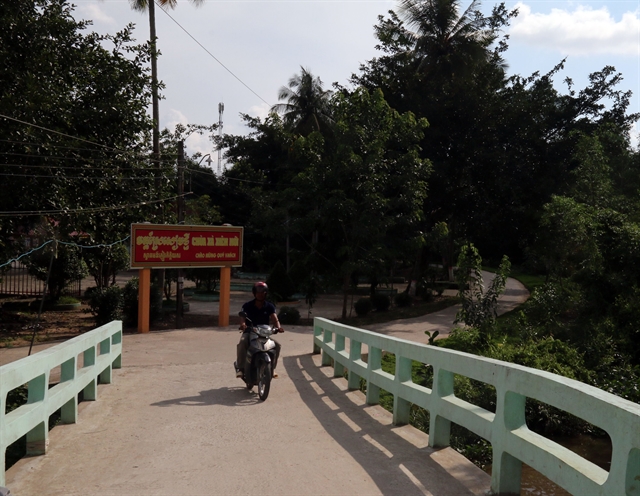 Society
Society

The lives of ethnic people in the Cửu Long (Mekong) Delta province of Kiên Giang have improved in recent years with the province implementing several measures for their socio-economic upliftment.

|
| Roads in villages in Kiên Giang Province’s Châu Thành District have been cemented. – VNA/VNS Photo Lê Sen |
KIÊN GIANG — The lives of ethnic people in the Cửu Long (Mekong) Delta province of Kiên Giang have improved in recent years with the province implementing several measures for their socio-economic upliftment.
In 2016 -18 the province spent more than VNĐ194 billion (US$8.3 million) to build infrastructure like bridges, roads and water supply facilities in ethnic minority areas and give housing and farming land to ethnic people, according to the province’s Ethnic Minority Affairs Board.
The province also undertook many programmes and campaigns to help poor ethnic people, mobilising more than VNĐ800 billion ($34.4 million) from individual and organisational donors for the purpose.
The Kênh 2 Hamlet Khmer Women’s Union in Vĩnh Thuận District’s Tân Thuận Commune has for instance helped its members abandon backward customs and taught them effective farming models to improve their incomes.
The union’s programme of “three cleans” (clean home, clean kitchen and clean street) has improved the living conditions and reduced sickness in the hamlet.
The union established a co-operative group for rotating rice with other crops in 2013 and admitted 21 local households as members so far. They are taught farming techniques and provided with soft loans.
According to Nguyễn Ngọc Tịnh, secretary of the Kênh 2 Hamlet Party Committee, the rice yields of the participating households have increased from seven tonnes per hectare per crop to eight tonnes.
They can earn an average of VNĐ150 million ($6,445) per hectare from growing a crop of water melon, cucumber or pumpkin.
Thị Um, one of the group members, said her family used to grow two rice crops a year but the income was not enough to cover the family’s expenses.
After joining the group, her family has begun to use advanced farming techniques to increase yield.
“Thanks to the group, my family has repaid all its debts and built a new house worth VNĐ150 million,” she said.
The province Women’s Union has given VNĐ100 million ($4,300) to the Hamlet 2 Khmer Women’s Union to provide loans to the group members for growing crops.
In Giang Thành District’s Vĩnh Điều Commune, many poor Khmer households have escaped poverty through the province’s support policies.
In 2003 some 320 poor families, nearly half of them Khmer, in Giồng Riềng, Châu Thành, Gò Quao, and An Biên districts moved to live in Vĩnh Điều border commune.
After the families moved in there, local authorities built roads and power supply and irrigation systems and gave them soft loans.
Every year the commune People’s Committee calls on donors to build houses for poor Khmer people.
The commune has carried out effective farming models like raising buffalos and cows and growing lotus in rice fields.
Danh Nho, whose family was among those that migrated there, said after more than 10 years of living there and with the province’s support policies, his and other Khmer families had stable lives and houses to live in.
“My children have been educated well and have proper jobs.”
After moving to the commune, Nho was given 3ha of farmlands and money to prepare the land for growing crops.
In 2012 he received VNĐ20 million ($859) to build a house and soft loans for growing crops.
The province has 285,550 people belonging to 26 ethnic minorities, who make up 15.4 per cent of the total population.
Of them, 237,867 are Khmer.
The average income in ethnic areas increased from VNĐ29 million ($1,250) in 2015 to VNĐ39 million ($1,680) last year, said the board.
The number of poor ethnic households in the province reduced from 10,346 to 4,845. VNS